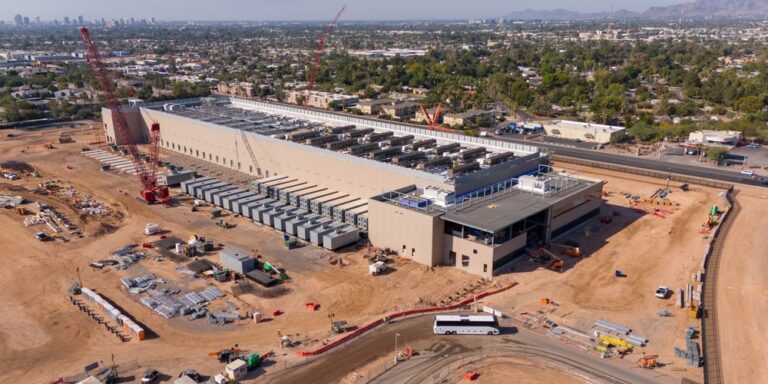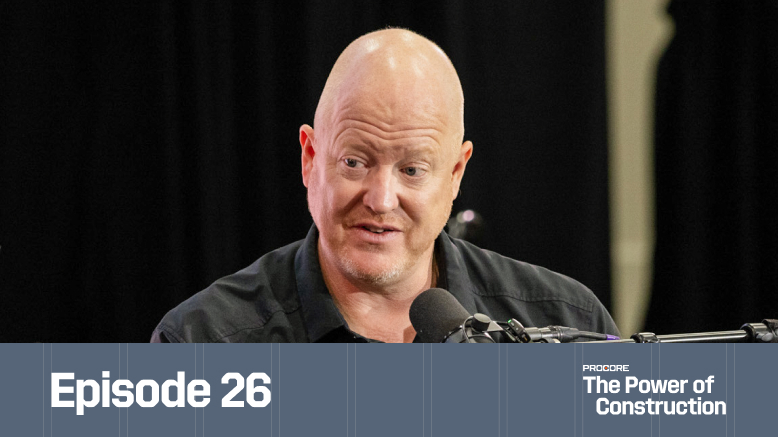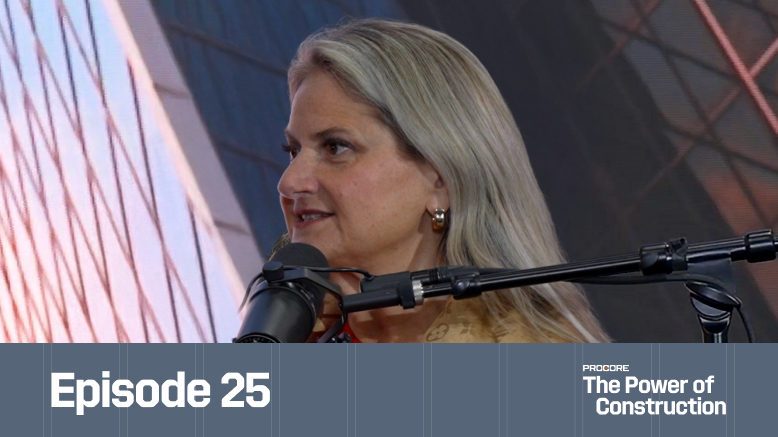— 5 min read
How AI is Shaping the Future of Data Center Construction


Last Updated Sep 23, 2025

Sandra Benson
Sandra Benson is the Vice President of Industry Transformation at Procore Technologies. Sandra has an award-winning record of success in business process improvement utilizing technology for construction, engineering, real estate, and professional services firms. Sandra offers special expertise in creating operational strategies and business development, spearheading market expansion, and directing technology functions. Sandra brings over 30 years of experience in the Building and Building Technology industry holding a number of executive positions including Worldwide Head of Engineering, Construction and Real Estate at Amazon Web Services, CIO/VP at Kentz/SNC-Lavalin, Global Industry Director of E&C at J.D. Edwards/Oracle and at Hexagon PPM. She has worked with many global E&C, EPC, and real estate companies throughout her career. She is heavily involved in organizations that lead the way for technology advancement in the building industry and serves on the Board of Directors of the National Institute of Building Sciences as well as member of the Board of advisors for ViaTechnik. She is an advocate for women’s leadership. Sandra has been a featured speaker and author at many industry events. She was ConstrucTech Woman of the Year in 2014 and serves as a judge for this award.

Kris Lengieza
Vice President, Global Technology Evangelist
29 articles
Kris Lengieza is the Global Technology Evangelist at Procore Technologies. Kris brings a wealth of experience and passion to the intersection of construction and technology. Previously serving as the VP of Global Partnerships & Alliances, Kris oversaw a diverse ecosystem spanning channel, ISV, public, and association partnerships. His recognition as one of the Top 40 Construction Professionals Under 40 by ENR and BD&C underscores his impact in the industry. Kris’ journey began with 15 years working in the construction field, where he embraced technology as an early adopter and strived to seamlessly integrate data across all construction solutions. As a futurist and construction tech evangelist, Kris now collaborates extensively with industry innovators, tech organizations, and construction companies. Together, they explore transformative technologies that promise to revolutionize our work processes. Kris has played a pivotal role in Procore’s product strategy, delivering industry and technology insights to improve how Procore’s solutions serve the industry.
Last Updated Sep 23, 2025

In the current digital age, the demand for data centers is surging like never before. This uptick is driven significantly by the exponential growth of artificial intelligence (AI) and the increasing need for cloud storage. Over one trillion dollars is projected to be spent on data center upgrades for AI by Amazon, Microsoft, Google and Meta. This article aims to unpack the evolving landscape of data center construction, explore the challenges involved, and offer actionable insights to help construction professionals stay competitive in this booming market.
Table of contents
Key Trends in Data Center Construction
Data center construction is undergoing a transformation driven by several key trends. Understanding these trends can help construction professionals align their strategies to meet evolving demands.
The AI Explosion
AI is at the crux of the data center demand surge. Traditional data centers primarily focused on storage and processing needs. However, AI data centers require more advanced infrastructure, heightened computational capacities, and energy efficiency upgrades.
- AI-Driven Demand: The explosion of AI technologies necessitates sophisticated data centers with enhanced processing power to handle complex algorithms and data analytics.
- Hyperscale Data Centers: Hyperscale centers are much larger than traditional data centers. A typical hyperscale data center has at least 5,000 servers, 500 cabinets and over 10,000 square feet of floor space.
Edge Computing and Innovative Data Center Models
Another key trend is the rise of edge computing and novel data center models. For instance, Microsoft is building a floating data center, and Amazon Web Services (AWS) is utilizing 18-wheelers as temporary data centers in remote locations.
- Edge Computing: This involves decentralizing data processing to locations closer to the data source to reduce latency and bandwidth use.
- Innovative Models: Floating data centers and mobile (truck-based) data centers exemplify creative solutions addressing land use constraints and flexible deployment needs.
Challenges in Data Center Construction
Despite the rapid growth and innovation, the data center construction industry faces several significant challenges. Addressing these challenges is crucial for staying competitive and ensuring project success.
Free AI in Construction Course with Hugh Seaton
Start learning today with industry expert Hugh Seaton and discover how AI can boost efficiency, reduce risk, and transform your projects.

Power Consumption and Infrastructure
One of the most pressing challenges is power consumption. Data centers are massive energy consumers, representing an estimated 2% of global energy consumption. The demand for data centers is so high that it's extending construction timelines by 24 to even 72 months based on power supply demands.
- Energy Demands: The construction and operation of data centers are limited by power availability and the infrastructure to support them.
- Sustainable Solutions: Companies are exploring renewable energy sources, on-site power generation, natural gas and small reactors to overcome power limitations.
Labor Shortages
The construction and operational phases of data centers require specialized skills that are increasingly scarce. The Department of Labor has highlighted a continuous 10% annual rise in labor demand since 2018, with projections showing a 15% increase in the near future.
- Skilled Labor: Both the construction and maintenance of data centers require highly specialized technicians.
- Remote Locations: Many data centers are built in remote locations, adding another layer of difficulty in attracting and retaining skilled labor.
Supply Chain Constraints
Post-COVID-19 supply chain issues continue to significantly impact data center construction. Key components like switchgears, power distribution equipment, generators and chillers experience significant delays, often extending beyond 52 weeks.
- Critical Components: The unavailability of crucial components affects construction timelines.
- Vertical Integration: Some companies are mitigating material unavailability by fabricating essential components in-house.
Strategies to Stay Competitive
To navigate the complexities of modern data center construction, companies need to adopt innovative and forward-thinking strategies. Here are some key approaches to stay ahead of the curve.
Embrace Prefabrication
Data center construction is increasingly leveraging prefabrication techniques to speed up the build process. This shift turns construction sites into more of an installation project rather than a traditional build.
- Benefits: Prefab reduces on-site labor needs and improves quality control.
- Challenges: Coordination and exact specifications are crucial, as any mismatch can cause significant project delays.
Innovative Power Solutions
Given the massive energy demands, construction companies must explore innovative power solutions to stay competitive.
- Renewable Energy: Utilizing solar, wind and hydrogen fuel cells can provide sustainable power solutions.
- On-site Generation: AWS, for instance, has turned to natural gas generation to support multi-facility campuses.
Advanced Planning and Collaboration
Effective preconstruction planning is critical. The planning process around a data center project is as critical — probably almost 5 times as critical as it is on any other commercial project.
- Early Collaboration: Engaging all stakeholders early can mitigate risks and streamline project timelines.
- BIM and Digital Twins: Leveraging Building Information Modeling (BIM) can aid in accurate planning and digital twins for operational analytics.
Leveraging Technology and AI
AI is not just driving demand but also offering solutions. From design and planning to operations, AI can streamline processes, predict challenges, and optimize resources.
- AI in Project Management: Using AI for project management can optimize timelines and resource allocation.
- Operational Efficiency: AI algorithms can enhance the operational efficiency of data centers by predictive maintenance and energy optimization.
Sustainability Initiatives
Sustainability is not just a regulatory requirement but also a competitive differentiator. Data centers are huge power consumers, and companies need to step up their sustainability game to win new projects and public approval.
- Sustainable Materials: Companies can make more with less using eco-friendly building materials and energy-efficient designs.
- Public Relations: Promoting sustainability efforts can help gain public support and regulatory approval.
Keys to Success: Innovation & Adaptation
The data center construction landscape is transforming rapidly, driven by AI, innovative models, and pressing power and labor challenges. To stay competitive, construction professionals must embrace advanced planning, prefab techniques, innovative power solutions, and sustainability initiatives. The current demand surge is an opportunity for innovation and growth. By leveraging technology, fostering early collaboration, and focusing on sustainability, construction companies can not only keep up but also lead in this evolving market.
There is much more to talk about. The industry's rapid evolution requires continual adaptation and innovation. Embrace these trends and strategies to stay ahead in the competitive landscape of data center construction.
Was this article helpful?
Thank you for your submission.
100%
0%
You voted that this article was . Was this a mistake? If so, change your vote
Scroll less, learn more about construction.
Subscribe to The Blueprint, Procore’s construction newsletter, to get content from industry experts delivered straight to your inbox.
By clicking this button, you agree to our Privacy Notice and Terms of Service.
Thank you!
You’re signed up to receive The Blueprint newsletter from Procore. You can unsubscribe at any time.
Categories:
Written by

Sandra Benson
Sandra Benson is the Vice President of Industry Transformation at Procore Technologies. Sandra has an award-winning record of success in business process improvement utilizing technology for construction, engineering, real estate, and professional services firms. Sandra offers special expertise in creating operational strategies and business development, spearheading market expansion, and directing technology functions. Sandra brings over 30 years of experience in the Building and Building Technology industry holding a number of executive positions including Worldwide Head of Engineering, Construction and Real Estate at Amazon Web Services, CIO/VP at Kentz/SNC-Lavalin, Global Industry Director of E&C at J.D. Edwards/Oracle and at Hexagon PPM. She has worked with many global E&C, EPC, and real estate companies throughout her career. She is heavily involved in organizations that lead the way for technology advancement in the building industry and serves on the Board of Directors of the National Institute of Building Sciences as well as member of the Board of advisors for ViaTechnik. She is an advocate for women’s leadership. Sandra has been a featured speaker and author at many industry events. She was ConstrucTech Woman of the Year in 2014 and serves as a judge for this award.
View profile
Kris Lengieza
Vice President, Global Technology Evangelist | Procore Technologies
29 articles
Kris Lengieza is the Global Technology Evangelist at Procore Technologies. Kris brings a wealth of experience and passion to the intersection of construction and technology. Previously serving as the VP of Global Partnerships & Alliances, Kris oversaw a diverse ecosystem spanning channel, ISV, public, and association partnerships. His recognition as one of the Top 40 Construction Professionals Under 40 by ENR and BD&C underscores his impact in the industry. Kris’ journey began with 15 years working in the construction field, where he embraced technology as an early adopter and strived to seamlessly integrate data across all construction solutions. As a futurist and construction tech evangelist, Kris now collaborates extensively with industry innovators, tech organizations, and construction companies. Together, they explore transformative technologies that promise to revolutionize our work processes. Kris has played a pivotal role in Procore’s product strategy, delivering industry and technology insights to improve how Procore’s solutions serve the industry.
View profileExplore more helpful resources

From “What Is” to “What If” in Construction
In this episode of The Power of Construction, futurist Nikolas Badminton challenges the industry to reimagine what’s possible when we move from “what is” to “what if.” Rather than planning...

Who is accountable for innovation in construction?
Everyone says construction needs to innovate—but no one agrees on who’s actually responsible for making it happen. Is it the owner? The builders? The tech vendor? Or is innovation everyone’s...

What Drives Better Safety Outcomes—Carrot, Stick, or “Zero Harm”?
On paper, construction has never looked safer. In reality, mental health claims are rising, workers are disengaged and the compliance playbook is broken. Garry Mansfield, co-founder of Scratchie, argues the...

Is the Tech Stack Construction’s Most Powerful Talent Strategy?
Construction doesn’t need more tech for tech’s sake—it needs tech that helps people build. In this episode, Dustin Burns, SVP of Technology & Business Solutions at McCownGordon, shares how relying...
Free Tools
Calculators
Use our calculators to estimate the cost of construction materials for your next project.
Templates
Find a template to help you with your construction project tasks.
Material Price Tracker
Get the latest U.S. retail prices and view historical trends for common building materials.
Glossary
Explore key terms and phrases used in the industry.
